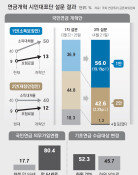The regulatory sandbox might not be enough
The regulatory sandbox might not be enough
Posted April. 28, 2020 07:38,
Updated April. 28, 2020 07:38
It has been more than a year since the South Korean government introduced “the regulatory sandbox,” one of the main pillars of its deregulation efforts. The framework allows startups to launch their new products without having to face the hurdle of regulations. Implemented early last year, the regulatory sandbox started showing results as relevant laws came into effect such as the act on supporting financial innovation. As of late last month, 218 business models in various fields from the ICT to industry convergence were approved under the scheme, which is remarkable compared to 40 a year in the United Kingdom. The United Kingdom, the first country that launched the framework, allows only Fintech startups to enter the sandbox.
Experiments with telemedicine and shared kitchens were made possible because the regulatory sandbox removed regulations for them. However, its impact is barely palpable for those who work in the fields. Inconsistency is one problem. Whether a business model obtains approval or not depends on which government department it is submitted to. There is also uncertainty that comes with the temporary removal of regulations. Businesses fear that they might have to scrap the entire business unless the existing law changes. Controversial businesses such as ride-hailing service Tada Taxi have not even been considered.
Celebrating the one-year anniversary of the regulatory sandbox, the government needs to review its deregulation efforts to see how effective they are. The importance of easing regulations in boosting the economy is growing once again as both the domestic and global economies are facing negative growth due to the COVID-19 outbreak. At a conference this newspaper organized with the Federation of Korean Industries and the American Chamber of Commerce in Korea, foreign businessmen agreed that outdated regulations should be removed to unlock the future of the Korean economy.
Many economic forecasts have put the growth rates of advanced nations at minus 5~6 percent. This will likely hit the South Korean economy, which is heavily dependent on exports. Hong Nam-ki, Minister of Economy and Finance, expressed Monday his concerns about an unprecedented economic recession.
Although the government is scrambling to increase its spending and provide financial support to prevent the collapse of the economy, it is private companies that can revive the economy and create jobs in the end. The government should accelerate its deregulation efforts so that businesses can create new markets with innovative products and services. The regulatory sandbox is not the only tool it can use. The government should be creative and aggressive in relaxing regulations by specifying what is not allowed as opposed to what is allowed.







